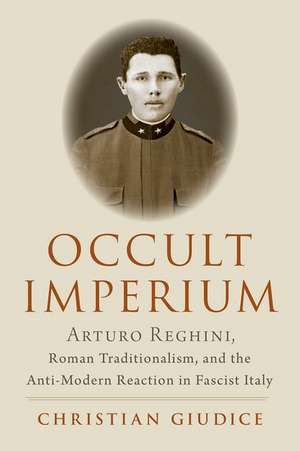Occult Imperium: Arturo Reghini, Roman Traditionalism, and the Anti-Modern Reaction in Fascist Italy: Oxford Studies in Western Esotericism
Autor Christian Giudiceen Limba Engleză Hardback – 3 mai 2022
Din seria Oxford Studies in Western Esotericism
- 30%
 Preț: 658.52 lei
Preț: 658.52 lei -
 Preț: 319.98 lei
Preț: 319.98 lei - 23%
 Preț: 777.35 lei
Preț: 777.35 lei - 25%
 Preț: 590.42 lei
Preț: 590.42 lei - 25%
 Preț: 527.14 lei
Preț: 527.14 lei -
 Preț: 475.37 lei
Preț: 475.37 lei - 30%
 Preț: 588.78 lei
Preț: 588.78 lei - 27%
 Preț: 490.86 lei
Preț: 490.86 lei - 27%
 Preț: 491.70 lei
Preț: 491.70 lei - 18%
 Preț: 174.88 lei
Preț: 174.88 lei - 19%
 Preț: 532.11 lei
Preț: 532.11 lei -
 Preț: 251.21 lei
Preț: 251.21 lei - 25%
 Preț: 585.30 lei
Preț: 585.30 lei - 21%
 Preț: 338.24 lei
Preț: 338.24 lei - 22%
 Preț: 498.66 lei
Preț: 498.66 lei - 14%
 Preț: 675.17 lei
Preț: 675.17 lei - 30%
 Preț: 559.30 lei
Preț: 559.30 lei - 30%
 Preț: 519.09 lei
Preț: 519.09 lei - 27%
 Preț: 401.37 lei
Preț: 401.37 lei
Preț: 559.97 lei
Preț vechi: 639.59 lei
-12% Nou
Puncte Express: 840
Preț estimativ în valută:
107.18€ • 116.46$ • 90.09£
107.18€ • 116.46$ • 90.09£
Carte disponibilă
Livrare economică 21-27 martie
Preluare comenzi: 021 569.72.76
Specificații
ISBN-13: 9780197610244
ISBN-10: 0197610242
Pagini: 344
Dimensiuni: 240 x 164 x 27 mm
Greutate: 0.66 kg
Editura: Oxford University Press
Colecția OUP USA
Seria Oxford Studies in Western Esotericism
Locul publicării:New York, United States
ISBN-10: 0197610242
Pagini: 344
Dimensiuni: 240 x 164 x 27 mm
Greutate: 0.66 kg
Editura: Oxford University Press
Colecția OUP USA
Seria Oxford Studies in Western Esotericism
Locul publicării:New York, United States
Recenzii
With this outstanding volume, Christian Giudice is offering us the first academic monograph ever dedicated to Arturo Reghini and his milieu. Erudite, wide-ranging and yet eminently readable, the present study illuminates the cultural and political roots of fin-de-siècle and early twentieth-century Occultism in Italy, up to and including the Fascist era. By retracing Reghini's intricate intellectual and Masonic journeys, Giudice gives us a penetrating analysis of the entanglements of occult spirituality, (neo)pagan Roman Traditionalism and an anti-modern political stance typical of the then cultural avant-garde, in an Italy grappling with the seemingly unstoppable onslaught of modernity, nationalism, and war.
Occult Imperium covers the life and work of Arturo Reghini, Italian esotericist, translator of René Guénon, and author of the original "Pagan Imperialism" of 1914, a work that inspired the title, and much of the content, of Julius Evola's Pagan Imperialism of 1928. Occult Imperium is recommended for all who have an interest in the history of Traditionalism, Guénon, and Evola, and also because it introduces us to the little-known Italian esoteric milieu from before the First World War to the Fascist period, a milieu that both echoes and differs from the better-known French esoteric milieu of the same period.
Based on a PhD thesis, this book is the first English monograph about the Italian esotericist Arturo Reghini (1878-1946). Through a detailed analysis of the social, cultural, and political context of Italy at the turn of the twentieth century, Giudice demonstrates the specificity of the ideals that informed the Schola Italica (Italic School), the neo-Pythagorean circle led by Reghini and his master Amedeon Armentano (1886-1966).
Giudice's book is highly recommended for those interested in Reghini, Italian occultism, and its ambiguous relationship with the Fascist regime.
Occult Imperium covers the life and work of Arturo Reghini, Italian esotericist, translator of René Guénon, and author of the original "Pagan Imperialism" of 1914, a work that inspired the title, and much of the content, of Julius Evola's Pagan Imperialism of 1928. Occult Imperium is recommended for all who have an interest in the history of Traditionalism, Guénon, and Evola, and also because it introduces us to the little-known Italian esoteric milieu from before the First World War to the Fascist period, a milieu that both echoes and differs from the better-known French esoteric milieu of the same period.
Based on a PhD thesis, this book is the first English monograph about the Italian esotericist Arturo Reghini (1878-1946). Through a detailed analysis of the social, cultural, and political context of Italy at the turn of the twentieth century, Giudice demonstrates the specificity of the ideals that informed the Schola Italica (Italic School), the neo-Pythagorean circle led by Reghini and his master Amedeon Armentano (1886-1966).
Giudice's book is highly recommended for those interested in Reghini, Italian occultism, and its ambiguous relationship with the Fascist regime.
Notă biografică
Christian Giudice received his PhD from the University of Gothenburg. His work focuses on the Italian esoteric milieu of the early twentieth century. His other interests include fin de siècle occultism in France, England and Italy, Guénonian Traditionalism, the history of Thelema, and the relationship between occultism and cinema.
